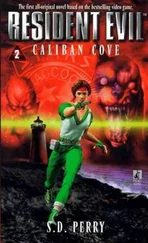Tim Stevens - Delivering Caliban
Здесь есть возможность читать онлайн «Tim Stevens - Delivering Caliban» весь текст электронной книги совершенно бесплатно (целиком полную версию без сокращений). В некоторых случаях можно слушать аудио, скачать через торрент в формате fb2 и присутствует краткое содержание. Год выпуска: 2012, Жанр: Триллер, на английском языке. Описание произведения, (предисловие) а так же отзывы посетителей доступны на портале библиотеки ЛибКат.
- Название:Delivering Caliban
- Автор:
- Жанр:
- Год:2012
- ISBN:нет данных
- Рейтинг книги:5 / 5. Голосов: 1
-
Избранное:Добавить в избранное
- Отзывы:
-
Ваша оценка:
- 100
- 1
- 2
- 3
- 4
- 5
Delivering Caliban: краткое содержание, описание и аннотация
Предлагаем к чтению аннотацию, описание, краткое содержание или предисловие (зависит от того, что написал сам автор книги «Delivering Caliban»). Если вы не нашли необходимую информацию о книге — напишите в комментариях, мы постараемся отыскать её.
Delivering Caliban — читать онлайн бесплатно полную книгу (весь текст) целиком
Ниже представлен текст книги, разбитый по страницам. Система сохранения места последней прочитанной страницы, позволяет с удобством читать онлайн бесплатно книгу «Delivering Caliban», без необходимости каждый раз заново искать на чём Вы остановились. Поставьте закладку, и сможете в любой момент перейти на страницу, на которой закончили чтение.
Интервал:
Закладка:
Pope had killed before, but never in such a planned way, and never with that same thrill of feeling he’d got from these two despatches. It was too soon after the killings for him to have any perspective on the emotions he was feeling, or what they signified about his personality. He’d tried them on for their fit; now he put them away again, as neatly as clothes into a wardrobe.
Once more he closed his eyes. This time, his thoughts turned towards not John Purkiss, not Taylor or Jablonsky, but somebody else.
*
23 June
Taylor brought in two more today. Prisoners, this time, local Hondurans by the look and sound of them. They’d been roughed up, which meant they probably resisted transfer.
Grosvenor and Z supervised the administration of the agent to each man in turn. I observed through the one-way mirrored glass. As before, the agent was intravenous, given by slow injection through an infusion set with saline running at the same time. Dehydration had been a problem with the last batch of subjects.
The first of the two men was the older and weaker-looking. Z stood by, making an occasional contribution — the glass wasn’t soundproofed but it did limit what I could hear — while Grosvenor conducted the interrogation. She paced, she alternately cajoled and raged and soothed; but she didn’t lay a finger on the man. The prisoner/subject didn’t hold out at all, started jabbering from the start. But he clearly wasn’t telling Grosvenor what she wanted to hear. As Grosvenor’s rantings grew more relentless the prisoner started gibbering and weeping. He was fastened to his chair and couldn’t move his torso or limbs, but his head rolled and slumped on his neck, back and forth.
After twenty-seven minutes — I kept time by the clock high on the wall at the back of the cell — the man died. His back went rigid, his neck arched, and all hell broke loose in the room. The medics ran in and Grosvenor and Z moved to free the man and lower him to the floor. I didn’t see the rest, but I found out later that he’d gone into cardiac arrest and all efforts to resuscitate him had failed.
The second of the two prisoners was more interesting, if that’s the word to use in a situation like this. He glared at his interrogators, scowled and spat at their questions, seemed intent on provoking and riling Grosvenor to make him lose control. Grosvenor’s performance was masterful — bearing in mind that I couldn’t hear much of what she was saying — in that she appeared at times close to snapping, to beating the prisoner into unconsciousness, but then switched to a demeanour of such sweet calmness that it must have been part of her stock-in-trade, and was unnerving in its obvious calculatedness. Grosvenor used physical force, to be sure: slapping, twisting the man’s ears, on one occasion grabbing his hair and forcing the head back past the point where it must have hurt; but there was never any sense that she was at the brink and ready to kill the prisoner for the sake of a moment’s gratification.
Thirty-nine minutes in, the prisoner began to show signs of fatiguing. His eyelids fluttered, his words — unheard by me — seemed to stumble from his mouth. Grosvenor pressed home her advantage, moving in ever closer to the man, wheedling and threatening and imploring, never stopping.
And then the experiment seemed to start bearing results. Frustrated at my inability to hear what was being said, I watched not Grosvenor or the prisoner but Z. He was standing back, presenting a one-quarter view to me through the one-way glass, but his back stiffened, his face tensing. Whatever the prisoner was saying, it was having an effect.
Grosvenor had gone very quiet — I could make out nothing she was saying, not even individual sounds — and her torso was between me and the prisoner, obscuring the man’s face. But when she stepped away, glancing across at Z, there was a flicker of triumph in her features.
The prisoner slumped in his seat, his torso held upright by his bonds but his head lolling forwards. For a moment I thought he’d succumbed, like the first man; but I caught sight of his eyes blinking faintly below his lowered brows. In a moment Z and Grosvenor conferred quickly and Z called something across. The medics came in, untied the prisoner and carted him away, having to support him under his arms if not quite carry him.
It was the first evidence I’d seen of the potential effectiveness of Caliban; and God help me, but I felt a stab of excitement at what they seemed to have achieved.
*
Pope had the words down pat in his memory. He was an eidetiker, one of those rare human beings with the ability to memorise text at a first reading; and he’d read the material more than once. He’d chosen this section to revisit, because the woman he was thinking about got a mention in the scenario. Had a starring role, in fact.
The woman was Grosvenor, and she was Pope’s next target.
Six
Hamburg
Sunday 19 May, 3.17 pm
Purkiss spotted the first tag two rows ahead of him on the plane. The second one he identified on the walk from the runway to the terminal building.
They were good, there was no question about that. The plane was a quarter empty so Purkiss had a range of seats to choose from, which meant the tags had the same; but instead of positioning themselves behind or beside him, at least one of them had sat in front. Not an obvious position for surveillance. But although the man never once glanced overtly across at Purkiss, never did anything to arouse the slightest suspicion, Purkiss sensed his otherness. He didn’t belong among the rest of the passengers. Again, there was nothing obvious about his appearance to suggest this: in his middle thirties, dressed in a navy suit and perusing the International Herald Tribune , he looked like just another cosmopolitan businessman on a mid-afternoon trans-European trip. But his aura of toughness, of centred wariness, gave him away to somebody with Purkiss’s sensitivity to such things.
The second man must have been sitting behind Purkiss. Walking across the tarmac in the light, cold rain that had greeted the Lufthansa flight, Purkiss stopped and turned as if to peer up at the plane he’d just left. Several people behind him glanced at him as they passed, but the tag — this one younger, shorter, his dark narrow looks more intense than those of the first man — avoided his gaze in a way that was deliberate.
Purkiss strode past the man towards the terminal, wanting to maintain the pretence that he was unaware of the surveillance. He felt the familiar cold burn between his shoulder blades, a primal reaction to the experience of exposing one’s back to an enemy. Ahead, on the escalator rising into the terminal building, he saw the first man.
He wasn’t sure, but they felt like Americans. CIA men.
*
Purkiss was travelling under his own name — there hadn’t been time to organise a cover passport before catching the flight out of Schiphol, and in any case there didn’t appear to be any need for a covert identity at this point — and experienced a flicker of tension when the woman at passport control glanced at his picture and then at his face. It was an old Service mantra: the longer you worked in the field, the more databases your details were likely to appear on. He hadn’t done much work in Germany before but the country’s intelligence service would have picked him up on their radar at some point, he was certain of it.
Nonetheless he was nodded through. He made his way past the baggage hall and through the EU arrivals channel. The first tag was lost from sight in the crowds milling in the arrivals hall. Purkiss slowed once he’d run the gauntlet of card-wielding greeters and pretended to rummage in the briefcase he was carrying. The second tag didn’t pass him, and was therefore hanging back, probably as the rear half of a box formation.
Читать дальшеИнтервал:
Закладка:
Похожие книги на «Delivering Caliban»
Представляем Вашему вниманию похожие книги на «Delivering Caliban» списком для выбора. Мы отобрали схожую по названию и смыслу литературу в надежде предоставить читателям больше вариантов отыскать новые, интересные, ещё непрочитанные произведения.
Обсуждение, отзывы о книге «Delivering Caliban» и просто собственные мнения читателей. Оставьте ваши комментарии, напишите, что Вы думаете о произведении, его смысле или главных героях. Укажите что конкретно понравилось, а что нет, и почему Вы так считаете.












